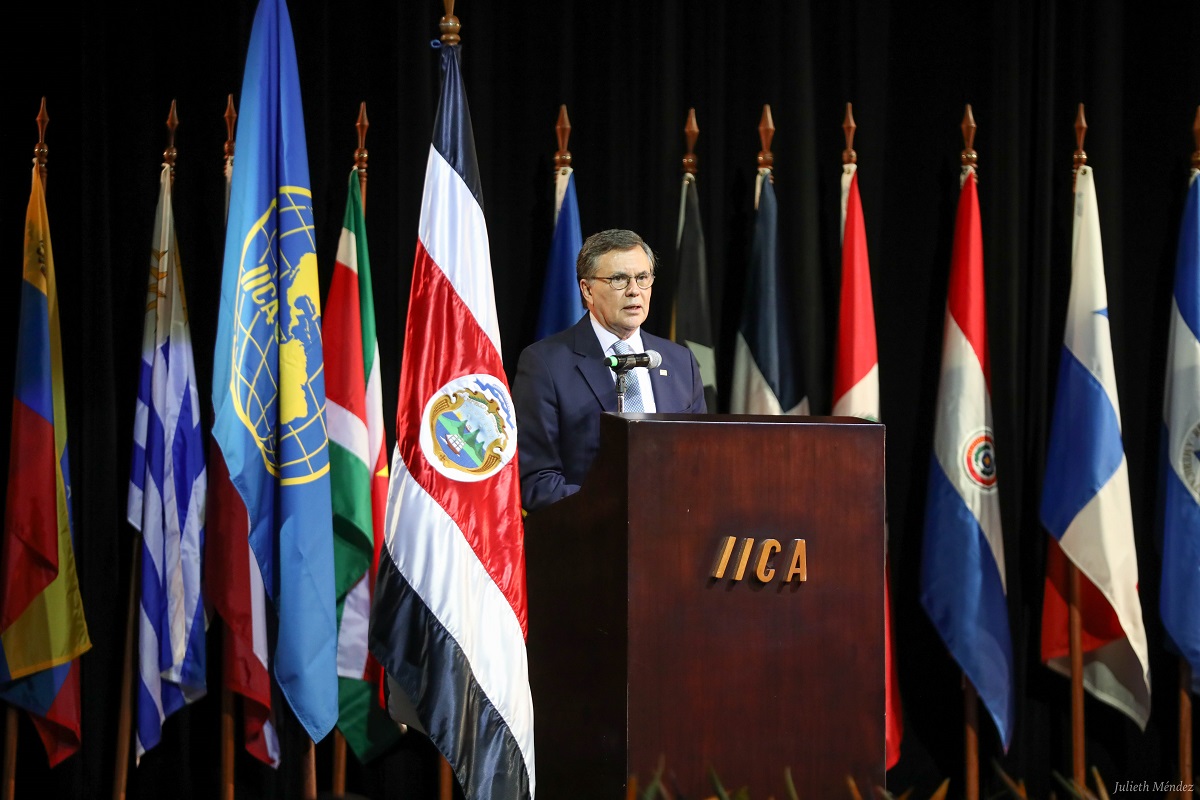Manuel Otero, Director General of the Inter-American Institute for Cooperation on Agriculture (IICA), in opening the 2019 Conference of Ministers of Agriculture of the Americas, emphasized the role of agriculture as an engine for economic and social development.

San Jose, 30 October 2019 (IICA). Appealing for agriculture to be accorded priority in public policies, the President of Costa Rica, Carlos Alvarado, and the Director General of the Inter-American Institute for Cooperation on Agriculture (IICA), Manuel Otero, presided over the opening of the 2019 Conference of Ministers of Agriculture of the Americas in San Jose.
The meeting, which is being attended by Ministers and Secretaries of Agriculture of IICA’s 34 member countries, is the main meeting of political authorities in the agriculture sector of the countries of the Americas and it focuses on issues such as efforts to combat food insecurity, the fostering of rural retention—in which digital technology stands to play a key role—and the need to boost productivity, while respecting the environment.
To this end, Otero stressed the importance of agricultural and rural development and agriculture’s potential to play a pivotal role in resolving or mitigating social problems in Latin America and the Caribbean.
IICA’s Director General indicated that, “We are striving to ensure that this activity is given priority in political agendas in our Hemisphere, because, in addition to education, agriculture is the most efficient option to tackle structural poverty, and thus it could be the best social policy”.
“Amidst the pressing problems that are creating tension in our region and in the world, agriculture stands out as an inseparable part of the solutions”, he added.
In the same vein, Otero explained that, Agriculture can provide meaningful solutions for the most severe problems facing human civilization and our planet today”, mentioning some such as “environmental challenges, extreme climate events, the energy crisis, food and nutritional insecurity, pressure on our natural resources and biodiversity, as well as poverty and mass migration”.
He remarked that, “All of these issues can be resolved, lessened or mitigated by one common denominator, and that denominator is agriculture”.
Since assuming office last year, the Director General of IICA, a veterinarian and graduate of the University of Buenos Aires, with a M.Sc. in Agricultural Development from the University of London and another in Animal Production from the Tropical Agricultural Research and Higher Education Center (CATIE) in Costa Rica, has been fast-tracking the modernization of the specialized agency for agricultural and rural development of the Inter-American system.
Otero maintained that, “We are working with countries to increase respect for the importance of guaranteeing better living conditions and greater equity for rural inhabitants, in a bid to resolve the problems that are causing them to abandon their farms and migrate. This will require a decisive focus on women and youth, which are fundamental issues for IICA”.
Further to these actions, Otero stressed that, “We must now take another look at rural areas, breaking the vicious cycle of poverty and exclusion, and treating them instead as areas of opportunity and social progress, which also generate quality employment”.
In concluding, he mentioned that “The Swedish Academy recently awarded the Nobel Prize for Economics to Banerjee, Duflo and Kremer for this very approach. It comforts us to see the recognition of the vision that better institutional structures and collective agreements reduce costs and facilitate access to technologies, thereby enabling our farmers to boost their income. This is IICA’s approach and a vision that we are promoting throughout the hemisphere”.
More information:
Institutional Communication Division.
comunicacion.institucional@











